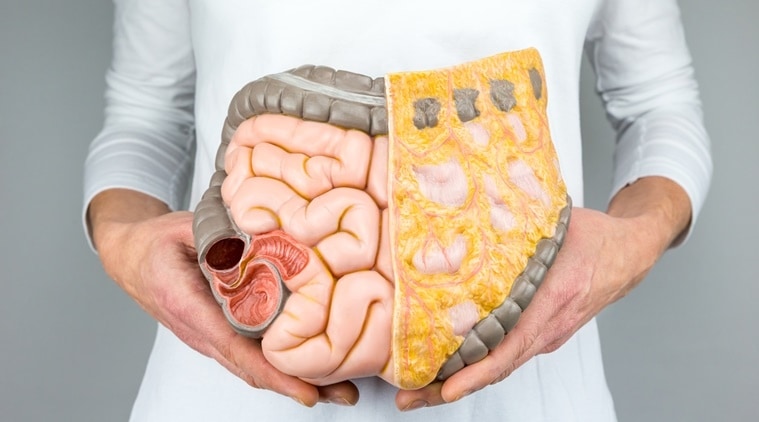Inflamed colon symptoms include diarrhoea with or without blood, abdominal pain and cramping, fever, nausea, fatigue, weight loss and bloating, among others.

Intestinal infections continue to be a cause of worry for many patients and their families. As per a June 2019 study published in Journal of Family Medicine and Primary Care, in a developing country like India, intestinal parasitic infections remain an important public health concern. “The infection remains the leading cause of morbidity and mortality, especially among children. It is presumed that the prevalence is high in developing countries probably due to poor sanitary conditions and improper personal hygiene practices.”
Colon infection
Colitis is a chronic digestive disease characterised by inflammation of the inner lining of the colon, the long, coiled, tube-like organ, also known as the large intestine, that is known to remove water and salt from digested food. When the body is ready for bowel movement, the waste is dumped into the rectum. According to National Center for Biotechnology Information (NCBI), “the colon is a common site of infection for a heterogeneous group of bacterial pathogens”.
As per Dr Vivek Vij, director, Fortis Hospital, Noida; Fortis Memorial Research Institute, Gurugram; Fortis Escorts Heart Institute, Okhla Road, “Colon infection or colitis is a broad term comprising any infection (bacterial, viral, amoebic etc.) of the large intestine. It can happen due to unhygienic food, water, etc.”
Symptoms
Inflamed colon symptoms include diarrhoea with or without blood, abdominal pain and cramping, fever, nausea, fatigue, weight loss and bloating, among others.
Causes of colon inflammation
Infection is one of the causes of colon inflammation. Colitis can be caused by viruses, bacteria and parasites. Infection colitis can be contracted from contaminated water, foodborne illnesses or poor hygiene.
Other causes include Inflammatory Bowel Disease (IBD), ischemic colitis and diarrhea and abdominal pain.
Prevention
It can also occur spontaneously in some patients with decreased immunity. It can be prevented by ensuring consumption of hygienic food and clean water. Patients with decreased immunity should be in regular touch with their physicians, advised Dr Vij.
Detection
Some common tests for colitis include X-rays of the colon, testing the stool for blood and pus, sigmoidoscopy and colonoscopy. Additional tests include stool cultures and blood tests, including blood chemistry tests.
Treatment
As per NCBI, “The presentation of disease in the colon is generally in the form of distinct syndromes, and it is important for physicians to recognise the causative organisms, because specific treatment is highly effective.”
The treatment depends on what is causing colitis. Many cases require a little more than symptomatic care, including clear fluids to rest the bowel and medications to control pain. Patients who have are acutely ill often need intravenous fluids among other interventions.
While colon infection caused by diarrhoea and colitis may potentially require antibiotics, depending on the cause, viral infections require fluids and time. Some bacterial infections, such as salmonella, do not need antibiotic therapy as the body is able to get rid of the infection on its own. Other bacterial infections, such as Clostridium difficile, require antibiotic treatment.
Inflammatory Bowel Disease (IBD)
Medications are often used to control IBD. Anti-inflammatory medications may be used initially and medications that suppress the immune system can be added, if necessary. Surgery may be an option in severe cases, including removal of the colon and small intestine.
Ischemic colitis
Intravenous fluids are given to rest the bowel and prevent dehydration. If sufficient blood supply is not restored, surgery may be needed to remove parts of the bowel that lost blood supply.
Diarrhea and abdominal pain
Initial treatment at home may include a clear fluid diet for 24 hours and rest. If symptoms resolve quickly, no further care is needed.
? The Indian Express is now on Telegram. Click here to join our channel (@indianexpress) and stay updated with the latest headlines
For all the latest Lifestyle News, download Indian Express App.
Source: Read Full Article



